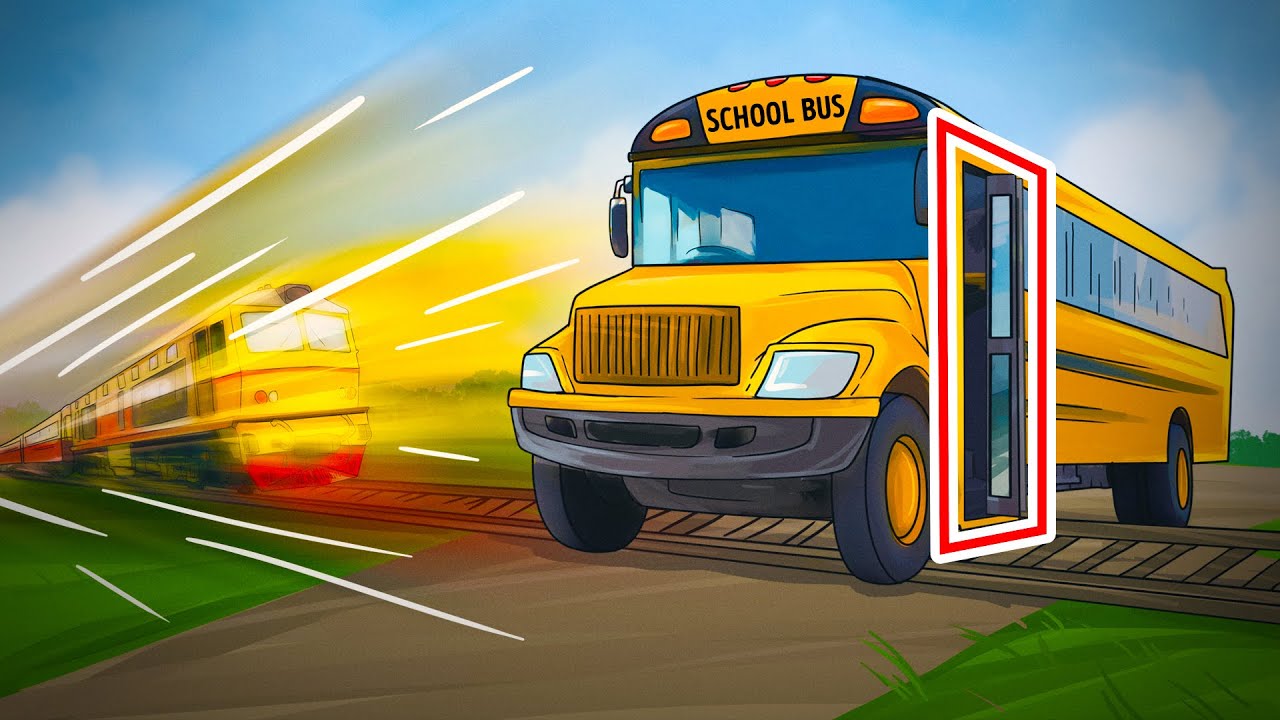Why Buses Open Doors on Railroad Tracks
Before it became law, school buses didn’t have to open their doors at railroads. Sure, they stopped to check for an oncoming train. But when visibility is low, say, in fog or during a snowstorm, that method can prove dangerously ineffective.
Everything changed in the 1930s, but the situation still wasn’t ideal. Originally, a student was assigned as a “lookout” during each ride. They’d get off the bus once it stopped and look both ways down the railroad crossing. This continued until it was decided that it was too big a responsibility put on these young volunteers’ shoulders.
Other videos you might like:
How to Choose a Safe Seat in 7 Types of Transport https://www.youtube.com/watch?v=qF4bRUNbeLo&;
14 Roads You Would Never Want to Drive On https://www.youtube.com/watch?v=uq7mztW1knU&;
Why Airplanes Are White https://www.youtube.com/watch?v=KchRdiTzDz0&;
TIMESTAMPS:
Why bus drivers open the door 0:48
Further safety precautions 1:47
Why are school buses yellow? 2:21
Why is the roof painted white? 2:47
Why are the windows tinted? 3:16
Why is the steering wheel so massive? 3:36
Why don’t they have seatbelts? 4:14
? The most fascinating bus facts ? 4:51
#buses #schoolbus #brightside
SUMMARY:
– It all comes down to safety and lessons learned. By opening the door AND their side window, a bus driver is better able to hear if a train is coming.
– Besides coming to a full stop 5 to 15 feet before the crossing (plus opening the door and window), bus drivers must turn off anything that creates distracting sounds, including the radio and fans.
– White reflects the sun’s heat better, so it keeps the inside of the bus 10° cooler.
– The dark tint of the windows blocks a lot of sunlight from getting in, and it retains interior heat in the winter!
– Most buses don’t have power steering. This system normally helps the driver use less force to turn the wheels. Buses don’t have it because there’s always the risk that it could fail.
– So far, 8 have passed laws requiring school buses to have seatbelts. Occasionally, individual school districts have the freedom to decide whether to implement them.
– There are currently about 427,000 school buses in America alone!
– If you’ve ever dreamed of owning your own big yellow bus, you can go to eBay now and purchase one for about $3,000.
– An average school bus can reach a max of 65 mph (although local speed limit laws for them are usually much lower!).
– The largest bus in the world is the Neoplan Jumbocruiser. They stopped production in 1992, but the jumbo-sized coach didn’t disappoint!
– The first buses were pretty much horse-drawn farm wagons in the late 1800s. The carriage was labeled “Public School” and it transported children that lived far away. (Most kids still walked to school at that time.)
– According to the American School Bus Council, buses save an estimated $7.7 billion every year!
– Buses also help our environment. If every child in a community rode the bus to school, it would save more than 2 billion gallons of fuel!
– One education report found that students who rode the bus were much less likely to miss school.
– There are perks to being a school bus driver! On field trips, they’re sometimes gifted free entrance to those destinations.
Music by Epidemic Sound https://www.epidemicsound.com/
Subscribe to Bright Side : https://goo.gl/rQTJZz
—————————————————————————————-
Our Social Media:
Facebook: https://www.facebook.com/brightside/
Instagram: https://www.instagram.com/brightgram/
5-Minute Crafts Youtube: https://www.goo.gl/8JVmuC
Stock materials (photos, footages and other):
https://www.depositphotos.com
https://www.shutterstock.com
https://www.eastnews.ru
—————————————————————————————-
For more videos and articles visit:
http://www.brightside.me/



![[ID: jvNU5bwzclI] Youtube Automatic](https://bizimtube.com/wp-content/uploads/2021/03/id-jvnu5bwzcli-youtube-automatic-236x133.jpg)
![[ID: 0yCJMt9Mx9c] Youtube Automatic](https://bizimtube.com/wp-content/uploads/2021/03/id-0ycjmt9mx9c-youtube-automatic-236x133.jpg)
![[ID: vAJM5EdDwjU] Youtube Automatic](https://bizimtube.com/wp-content/uploads/2021/03/id-vajm5eddwju-youtube-automatic-236x133.jpg)
![[ID: LxOmofEFub4] Youtube Automatic](https://bizimtube.com/wp-content/uploads/2021/03/id-lxomofefub4-youtube-automatic-236x133.jpg)
![[ID: wFAh77GBsHs] Youtube Automatic](https://bizimtube.com/wp-content/uploads/2021/03/id-wfah77gbshs-youtube-automatic-236x133.jpg)
![[ID: tjwrG4Debc4] Youtube Automatic](https://bizimtube.com/wp-content/uploads/2021/03/id-tjwrg4debc4-youtube-automatic-236x133.jpg)
![[ID: _28bYGZtnU8] Youtube Automatic](https://bizimtube.com/wp-content/uploads/2021/03/id-28bygztnu8-youtube-automatic-236x133.jpg)
![[ID: 1e7bhUjUEJ8] Youtube Automatic](https://bizimtube.com/wp-content/uploads/2021/03/id-1e7bhujuej8-youtube-automatic-236x133.jpg)
![[ID: QjyCviSKY2U] Youtube Automatic](https://bizimtube.com/wp-content/uploads/2021/03/id-qjycvisky2u-youtube-automatic-236x133.jpg)
![[ID: -5i-vB4-kFk] Youtube Automatic](https://bizimtube.com/wp-content/uploads/2021/03/id-5i-vb4-kfk-youtube-automatic-236x133.jpg)
![[ID: covHhQgr5kU] Youtube Automatic](https://bizimtube.com/wp-content/uploads/2021/03/id-covhhqgr5ku-youtube-automatic-236x133.jpg)
![[ID: mX7FEHws43A] Youtube Automatic](https://bizimtube.com/wp-content/uploads/2021/03/id-mx7fehws43a-youtube-automatic-236x133.jpg)